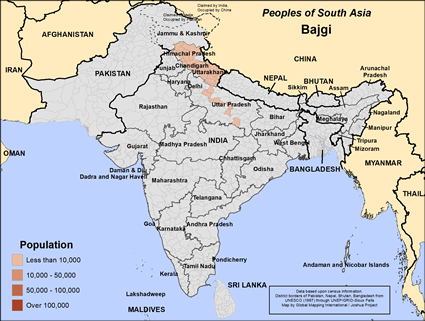Bajgi in India

Photo Source:
COMIBAM / Sepal
|

Map Source:
People Group data: Omid. Map geography: UNESCO / GMI. Map Design: Joshua Project.
|
| People Name: | Bajgi |
| Country: | India |
| 10/40 Window: | Yes |
| Population: | 32,000 |
| World Population: | 32,000 |
| Primary Language: | Garhwali |
| Primary Religion: | Hinduism |
| Christian Adherents: | 0.00 % |
| Evangelicals: | 0.00 % |
| Scripture: | New Testament |
| Ministry Resources: | Yes |
| Jesus Film: | Yes |
| Audio Recordings: | Yes |
| People Cluster: | South Asia Dalit - other |
| Affinity Bloc: | South Asian Peoples |
| Progress Level: |
|
Introduction / History
The Bajgi community's name is derived from the Garhwali word "baj" which refers to the playing of music. They play drums and other instruments in Hindu temples and at important life ceremonies like births, weddings and funerals.
The Bajgi are classified as a scheduled caste which means they receive preferences in government jobs and university admissions.
The two main languages of the Bajgi are Garhwali and Hindi. The New Testament and the JESUS Film are available in Garhwali. Many Christian resources exist in Hindi. They live in north central India.
What Are Their Lives Like?
The Bajgi people are best known for playing drums on Hindu holidays. Many of them are tailors or barbers. Because these professions involve interacting with other communities, they share common folk art and even marriage partners with other people groups. Many Bajgi also work in agriculture on land owned by others. Illiteracy is a problem for the Bajgi especially for their women and girls.
The Bajgi marry within their group and with other sudra level castes. They tend to have a large number of children. Rural Bajgi often lack access to modern medicine and clean water.
Sons inherit their father's property. It is the sons' responsibility to take care of elderly relatives. Bajgi marry one spouse. Their children often quit school after a few years to help their families make a living. Some Bagji have received a college education and now work in government and the professions. Young Bajgi people are leaving village life and moving to Indian cities searching for a better life. They frequently lack job skills so they are forced to take low-paying jobs.
What Are Their Beliefs?
The Bajgi people practice Hinduism, the ancient religion of India. Hinduism is a catch-all phrase for the local religions of South Asia, so it is very diverse. At the popular level, Hindus worship and serve the gods of the Hindu pantheon. They visit Hindu temples and offer prayers, food, flowers, and incense to their gods in hopes of gaining protection and benefits. They do not have a personal or familial relationship with their gods as Christians do. There are other Hindus who are much more philosophical, especially among the Brahmins.
Almost all Hindus participate in yearly celebrations like Holi, the festival of colors and the start of spring / Diwali, the festival of lights / Navratri, the celebration of autumn / and Rama Navami, Rama's birthday.
What Are Their Needs?
Rural Bagji need access to modern medicine. They need new job skills so they can prosper in the modern Indian economy. Most of all the Bajgi need to hear and respond to the gospel of Jesus Christ. He alone can forgive their sins and grant them eternal life.
Prayer Points
Pray that the Bajgi communities will find Christ to be the only one God worthy of their worship.
Pray for the Lord to send out loving workers to the Bajgi people.
Pray for dreams and visions to draw Bajgi elders and leaders to the only savior.
Pray that the Lord will raise up a growing church among the Bajgi of India in this decade.